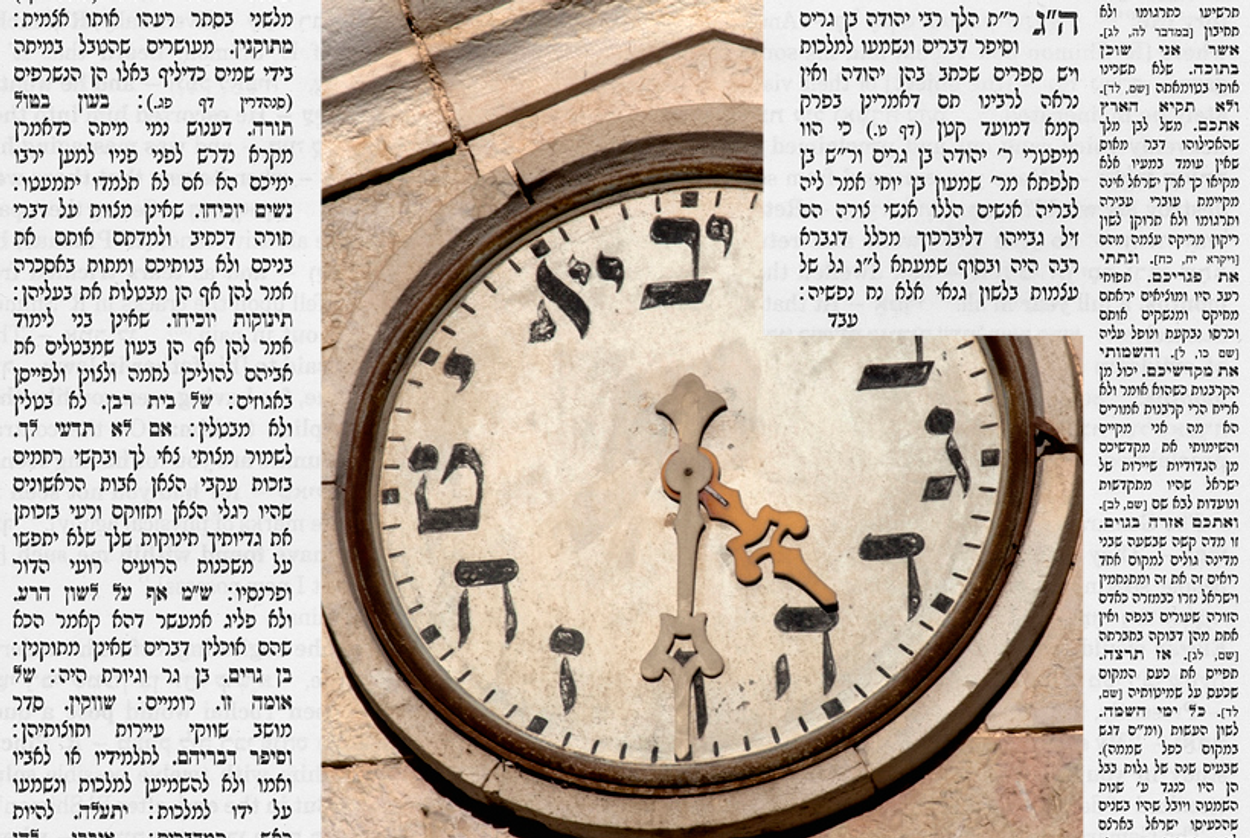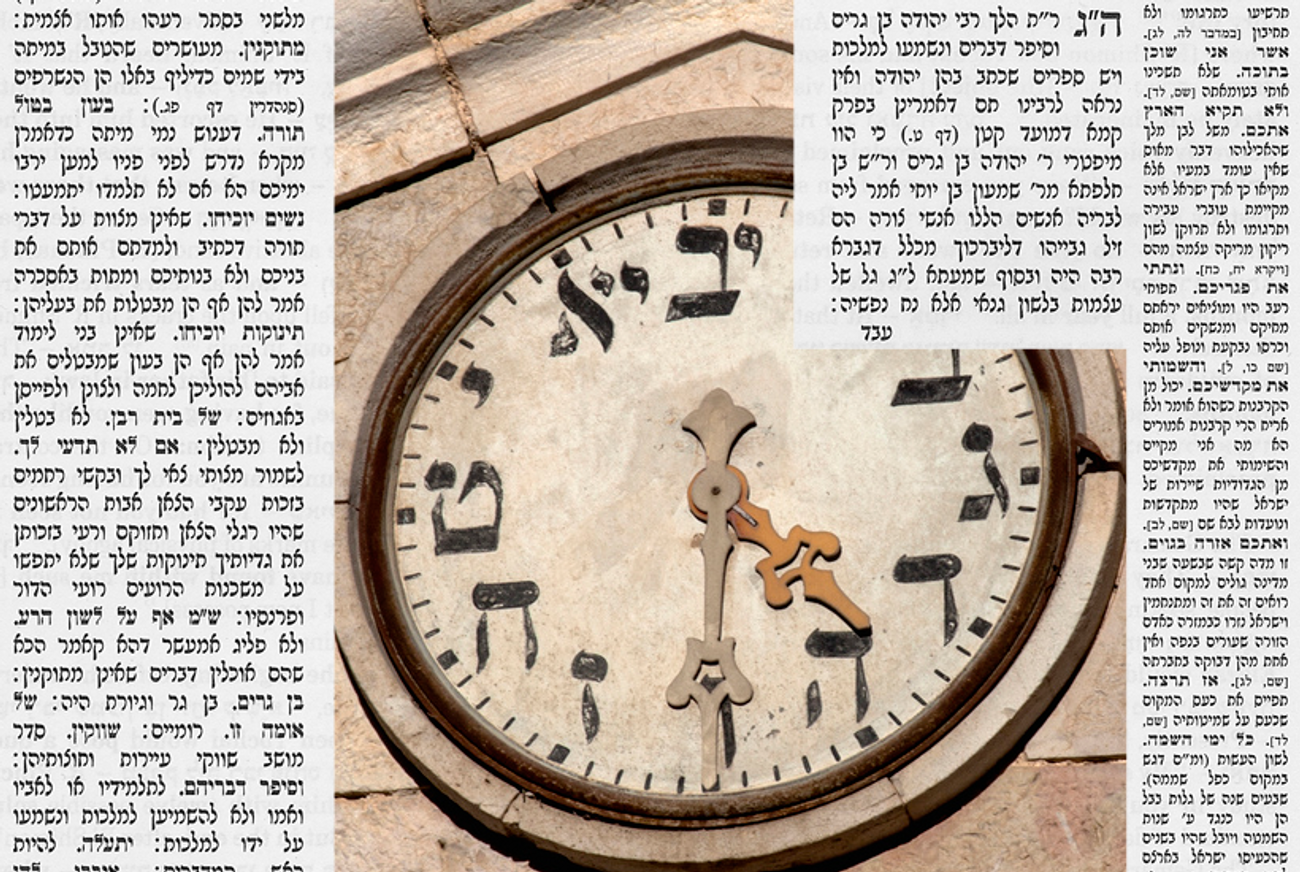On the Impossibility of Over-Interpreting the Bible
Why Talmud study is not reading, in the usual sense of the word, but rather deciphering the true meaning of the text




Literary critic Adam Kirsch is reading a page of Talmud a day, along with Jews around the world.
When does the Jewish year begin? The answer seems obvious: Everyone knows it’s Rosh Hashanah, whose name literally means “first of the year.” Yet if you read the Bible, it becomes clear that God himself had a different idea. In Exodus 12, God addresses Moses and Aaron directly, telling them that Nisan, the month of the Exodus from Egypt, “shall mark for you the beginning of the months; it shall be the first of the months of the year for you.” (Though the Bible does not actually use the word “Nisan”: the names of the months as we know them are Babylonian and date from the Babylonian exile in the 6th century B.C.E.) It makes perfect sense that Nisan, which marks the beginning of Jewish freedom and includes the most important Jewish holiday, Passover, would be the month chosen to begin the year. And as we read earlier in the Daf Yomi cycle, in Tractate Shekalim, it was in Nisan that the Temple authorities marked the new year for the purposes of collecting tithes. Why, then, do we celebrate Rosh Hashanah on the first of Tishrei, six months later?
This question, which has long puzzled me, receives a kind of answer in the first chapter of Tractate Rosh Hashanah, which we began reading this past week. The first mishna in the tractate explains that there are, in fact, four different days in the Jewish calendar that can be said to mark the New Year. The first of Nisan, the rabbis explain, is “the New Year for kings.” Official documents, as the Gemara goes on to clarify, were usually dated in Talmudic times by the regnal year of the king: A promissory note, for instance, might come due in the ninth year of the reign of King So-and-So. For these purposes, a year is considered to start on the first of Nisan, just as God instructs in the Bible. A corollary of this rule is that, if a king starts reigning even one day before Nisan starts—if he takes the throne on the 29th of Adar—that one day counts as the first year of his reign, and the coming of Nisan marks the beginning of the second year.
The cycle of festivals, too, is considered to start in Nisan; but in this case we count from the 15th of Nisan, which is the beginning of Passover. This means that a Jewish year always contains the major festivals in the same order—Passover, Shavuot, and Sukkot. As the Gemara explains in detail, starting on Rosh Hashanah 4a, this is significant because of the law governing the payment of vows. In Temple times, it was common practice to vow to bring an animal sacrifice or to donate an item to the Temple, as a way of giving thanks for good fortune or expressing gratitude to God. But such a vow had to be fulfilled promptly: “When you shall vow a vow to the Lord your God, you shall not delay in paying it,” says Deuteronomy 23:22.
What qualifies as a delay? According to Rabbi Shimon, “once three festivals have passed, he transgresses.” That is, you must fulfill your vow before the cycle of Passover, Shavuot, and Sukkot has ended. But does this mean the festivals have to pass in that order, or simply that each festival must occur once? The difference could be significant, depending on when your vow was made. Imagine that the rule is that each festival must occur once, no matter the order. In that case, if you made a vow the day before Passover, you would have only until Sukkot of the same year to fulfill it—about half a year. But if you made the vow the day after Passover, you wouldn’t have to fulfill it until you had passed through Shavuot, then Sukkot, then Passover again—a full 12 months.
On the other hand, if you believe, with Rabbi Shimon, that the three-festival cycle applies only to the festivals in order, then for any vow taken after Passover, the countdown clock would not begin until Passover came again the following year, which might give you as much as 23 months to fulfill your vow. As Shimon says, “The festivals are sometimes three, sometimes, four, sometimes five. If one made his vow before Passover, three; before Shavuot, five; before Sukkot, four.”
Other rabbis, however, are not nearly so lenient. “Rabbi Meir says: Once even one Festival has passed, one transgresses the prohibition ‘You shall not delay.’ ” Rabbi Eliezer ben Ya’akov allows two holidays to pass, while Rabbi Elazar says the key date is Sukkot: Once that holiday comes, if you haven’t fulfilled your vow, you’re in arrears. Each of these positions is backed up by citations from the Bible that are interpreted according to the sometimes counter-intuitive canons of Talmudic exegesis. Why, for instance, does Eliezer ben Ya’akov allow two holidays to pass before a vow is considered late? It is because of a verse from Numbers: “These things you shall do to the Lord in your appointed times.” The word “times” is plural, indicating that two such times can pass before they are no longer considered “appointed.”
This is an example of the way the Talmud deduces laws from every single word of the Torah, even when they don’t obviously apply to the matter at hand. Another instance comes in Rosh Hashana 6a, where the rabbis break down a verse from Deuteronomy into its component parts and deduce a law from each one. Apropos the keeping of vows, Deuteronomy states: “That which is gone out of your lips you shall keep and do; as you have vowed a gift to the Lord your God, which you have promised with your mouth.” A casual reading might ascribe the redundancy in this verse—“keep and do,” rather than just “keep”; “promised with your mouth,” rather than just “promised”—to biblical rhetoric and idiom. To the rabbis, however, each clause is there for a specific legal reason:
“That which is gone out of your lips”: This is a positive mitzvah. “You shall keep”: This is a prohibition. “And do”: This is an admonition to the court to make you fulfill your vow. “As you have vowed”: This is referring to a vow-offering. “To the Lord your God”: This is referring to sin-offerings, guilt-offerings, burnt-offerings, and peace-offerings. “As a gift”: This is understood in its literal sense to be referring to a gift-offering. “Which you have promised”: This is referring to objects consecrated for Temple maintenance. “With your mouth”: This is referring to vows of charity.
This is not reading in the usual sense of the word. Rather, it is using the Bible text almost as a kind of mnemonic, assigning a different category of promise to each phrase in the verse. One of the things I often wonder in reading the Talmud is exactly what the rabbis meant when they said that theirs is the true meaning of the text. Did they think that the references to burnt-offerings and Temple donations and charity could actually be deduced from the apparently unrelated words of the Bible? Or did they believe that God had dictated the text in such a way as to make room for all the necessary legal interpretations? Either way, it’s clear that the rabbis read the Bible not simply as a sacred history, but as a comprehensive guide to law and life. Since every word was divine, and God does nothing without a reason, it was impossible to over-interpret the Bible; everything that one found there had to have been put there.
All these matters arise from just the first of the four New Year’s Days listed in the mishna—the first of Nisan. Then there is the first of Elul, “the New Year for animal tithes”: Animals born after the first of Elul must be tithed in the subsequent year. The first of Shevat is “the New Year for the tree”: The fruit produced after that date must be tithed during the next 12 months. Alternatively, according to Beit Hillel, it is the 15th of Shevat that counts—I assume this is the origin of the holiday of Tu B’Shevat, which has evolved from a sacrifice day into a kind of Jewish version of Arbor Day.
And then there is first of Tishrei, when we actually celebrate Rosh Hashanah: This is “the New Year for counting years,” an ambiguous phrase. How is counting years from Tishrei different than counting them from Nisan? The rabbis themselves are not totally sure, offering a variety of explanations. According to Rav Pappa, in Rosh Hashana 8a, documents are dated according to the year that begins in Tishrei. But as the Gemara points out, this directly contradicts what was said earlier about dating documents according to kings’ reigns, which are measured from Nisan. “This is not difficult,” the Talmud says, the standard formula for resolving an apparent contradiction. Jewish kings’ reigns are dated from Nisan; but gentile kings’ reigns are dated from Tishrei, and since the Jews now live under gentile kings, their documents must use that system. Alternatively, Rabbi Zeira explains that Tishrei is used as the beginning of the year for the purposes of solar and lunar calculations, since “the world was created in the month of Tishrei.”
Only at this point does someone bring up the traditional religious significance of Rosh Hashanah. “Rav Nachman bar Yitzchak said: It is with regard to judgment” that the first of Tishrei marks the New Year. “From the beginning of the year judgment is passed as to what will happen at the end of the year.” Indeed, the Gemara goes on to say that it is not just the Jewish people who are judged on Rosh Hashanah, but the entire world. However, the Jews are judged first, in keeping with their assumed priority in God’s eyes: “When a king and a community are brought before God for judgment, the king is brought in for judgment first.” This insistence on Jewish superiority is in marked contrast to the actual social inferiority of Jews during the Talmudic era. The rabbis may have believed the Jews were like kings, but few Romans or Persians would have agreed with them.
***
To read Tablet’s complete archive of Daf Yomi Talmud study, click here.
Adam Kirsch is a poet and literary critic, whose books include The People and the Books: 18 Classics of Jewish Literature.
Adam Kirsch is a poet and literary critic, whose books include The People and the Books: 18 Classics of Jewish Literature.